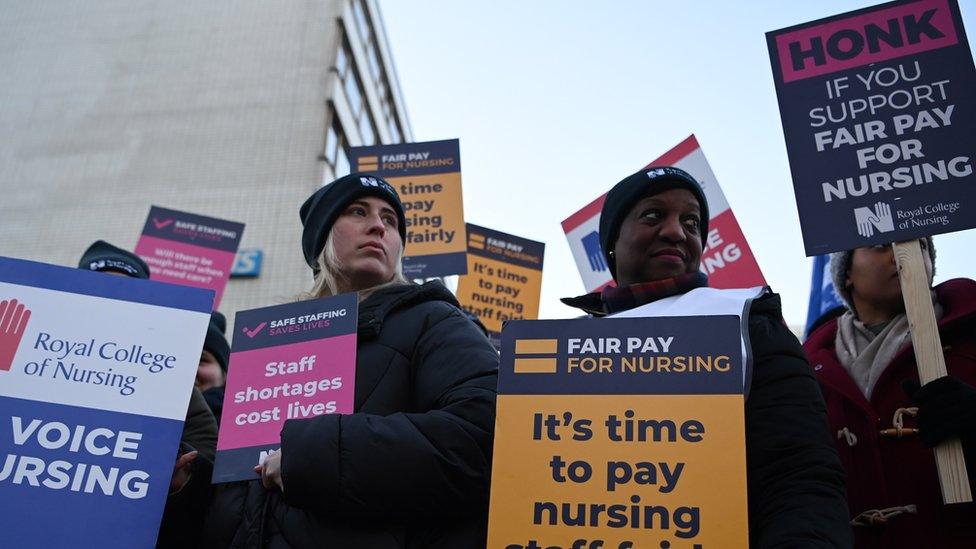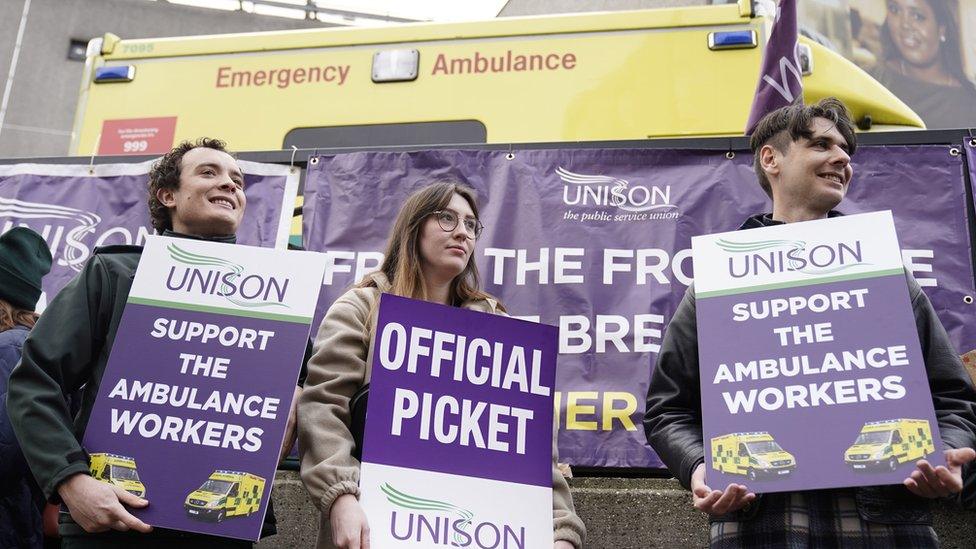Tone shifting on both sides after latest pay talks
- Published
- comments

Let's be blunt: we are not wildly closer to all these strike rows being sorted out than we were.
But it is also true that we were never likely to be, after a series of short meetings between trades union officials and government ministers earlier.
The tone, though, has undeniably shifted, on the government side and among at least some of the unions.
Ministers continue to hint, both publicly and privately, that they might be willing to compromise - although the details of how they might do this don't appear worked through yet.
It is worth remembering the basis upon which today's talks between ministers and unions were convened.
It was to talk about what pay might look like in the next financial year starting in April - not the pay striking workers are receiving now, which in many instances is the root cause of the current industrial action.
But what was also hinted at over the weekend by the prime minister publicly, and other government sources privately, was that there may be scope to do something about pay now.
Could a one-off hardship payment in various sectors caught up in industrial action be an option?
It is an idea being explored by the Labour government in Wales, and it is not being instantly dismissed at Westminster for England any more.
An idea that just a few short weeks ago before Christmas was flatly rejected by Downing Street and the Treasury, having been floated by Health Secretary Steve Barclay, now appears to be back in play.
Backdating pay
And here's another idea being discussed: backdating any pay deal for the next financial year to the start of this calendar year, giving workers another three months at whatever rate they secure in the pay settlement now being worked on.
Both of these options would allow ministers to say they haven't reopened the existing pay settlement, but would also allow them to say they have listened to what the trades unions are saying.
But they are, at least as things stand, signals of potential intent, rather than anything more concrete.
How much would a one-off payment be? "A few hundred quid? No way. A thousand quid? Well, maybe we'd be getting somewhere," one union source suggested to me.
What would be the level of pay backdated to the beginning of this year? We, and the unions, don't know.

Ambulance worker strikes are set to continue later this week
All of this illustrates a subtlety playing out on both sides. There can be disagreements within government.
"A settlement needs to be arranged, and quickly," said one government source, pointing out there is always a resolution in the end, so it made sense to do one sooner rather than later to minimise the damage strike action can cause.
Another emphasised that the central truth, as they saw it, is there isn't any money left in government coffers and plenty of workers in sectors without a big union presence are struggling, so why should they cave into union demands?
And, yes, there are disagreements, or at the very least differences of emphasis, between trades unions: Unite were much more angry and condemning of the government after the meeting at the Department of Health than Unison were.
Anti-strikes bill
But all this also highlights some simple, bald truths.
There are industrial disputes playing out in different nations of the UK, in different sectors, involving different unions and different governments. Plenty, in all the nations, look rather difficult to sort out.
As far as England is concerned, after this set of meetings, the strikes that were already in the diary are still in the diary.
Next, the government moves onto the other side of its approach: introducing a new law to attempt to limit their impact in half a dozen different sectors.
The bill, the planned new law to do this, is to be published, with Business Secretary Grant Shapps heading out and about to make the case for it.
A pragmatic response to strike action in some of our most vital public services? Or a draconian limitation on the capacity of workers to legally withdraw their labour?
Let that debate begin...
Related topics
- Published9 January 2023
- Published1 August 2023

